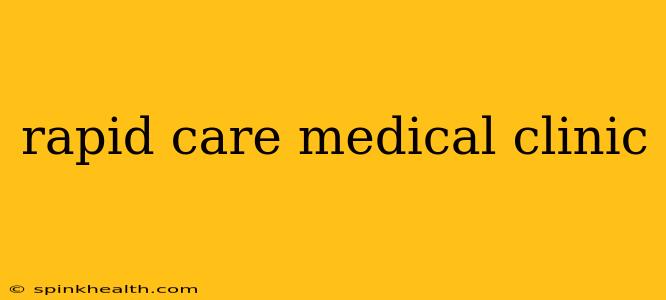In today's fast-paced world, waiting hours in a doctor's office is a luxury most of us can't afford. That's where rapid care medical clinics step in, offering a convenient and efficient alternative for non-emergency medical needs. But with so many options available, choosing the right clinic can feel overwhelming. This comprehensive guide will unravel the mysteries surrounding rapid care clinics, helping you navigate the process with confidence and ease.
What Exactly is a Rapid Care Medical Clinic?
Imagine a medical facility designed for speed and efficiency, without compromising on the quality of care. That's the essence of a rapid care medical clinic. Unlike emergency rooms, which handle life-threatening situations, rapid care clinics focus on treating non-emergency illnesses and injuries. Think common colds, flu symptoms, minor cuts and bruises, allergic reactions, or even simple check-ups. They bridge the gap between urgent care and a scheduled appointment with your primary care physician, offering quick access to medical attention when you need it most.
My own experience with a rapid care clinic involved a nasty case of bronchitis. Instead of waiting days for an appointment with my primary care physician, I was able to walk into a nearby clinic, get seen within minutes, and receive the necessary treatment to alleviate my symptoms. This experience highlighted the invaluable convenience and speed offered by these facilities.
What Types of Conditions Do Rapid Care Clinics Treat?
Rapid care clinics handle a wide range of non-emergency medical issues. To give you a better idea, here's a list of common conditions they typically address:
- Upper Respiratory Infections: Cold, flu, bronchitis, sinusitis
- Minor Injuries: Cuts, scrapes, sprains, minor burns
- Allergies: Allergic reactions, seasonal allergies
- Skin Infections: Rashes, minor infections
- Gastrointestinal Issues: Upset stomach, vomiting, diarrhea (excluding severe cases)
- Ear Infections: (In many cases)
- Eye Infections: (In many cases)
What is the Difference Between Urgent Care and Rapid Care?
This is a common question. While the terms are often used interchangeably, there can be subtle differences. Urgent care centers generally offer a broader range of services, sometimes including X-rays and more extensive treatments. Rapid care clinics often focus on quicker, more streamlined service for common ailments. The best way to understand the distinction is to check the specific services offered by individual clinics in your area.
How Much Does a Visit to a Rapid Care Clinic Cost?
The cost of a visit to a rapid care clinic varies depending on location, services received, and insurance coverage. It's always best to call ahead and inquire about pricing and insurance acceptance before your visit. Many clinics offer transparent pricing information on their websites.
Are Rapid Care Clinics Covered by Insurance?
Most major insurance providers cover visits to rapid care clinics, but it's crucial to verify your coverage with your specific insurance plan before your visit. Bring your insurance card with you to the clinic for efficient processing.
Do Rapid Care Clinics Offer Lab Services?
While some rapid care clinics offer basic lab services, such as rapid strep tests or flu tests, others may not. It's essential to confirm the availability of lab services with the specific clinic before your visit.
Finding the Right Rapid Care Medical Clinic for You
Choosing the right rapid care clinic involves considering several factors:
- Location: Select a clinic conveniently located near your home or workplace.
- Hours of Operation: Choose a clinic with hours that suit your schedule.
- Services Offered: Ensure the clinic provides the specific services you need.
- Insurance Coverage: Confirm that the clinic accepts your insurance plan.
- Patient Reviews: Check online reviews to get an idea of the clinic's reputation and patient experience.
Rapid care medical clinics offer a valuable healthcare solution, providing quick and convenient access to medical attention for non-emergency needs. By understanding their services and choosing the right clinic, you can experience efficient and effective healthcare without long waits or complicated scheduling. Remember to always prioritize your health and seek medical attention when necessary.

